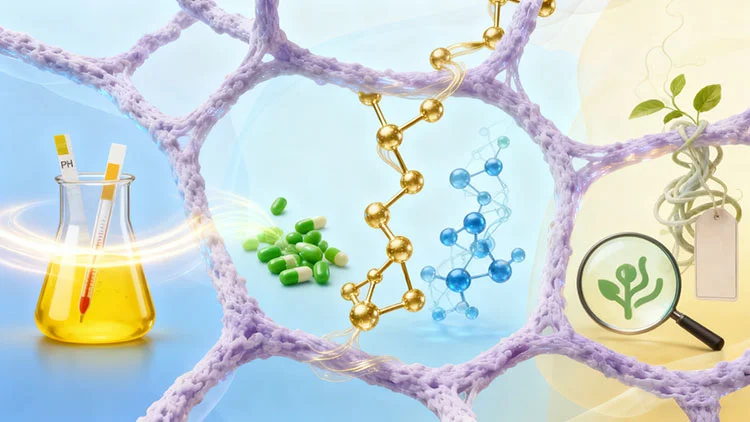Can Lentinus Edodes Polypeptide Be the Next Key Ingredient in Beauty & Health?
In recent years, the beauty and health industries have been on a constant quest for innovative ingredients that can deliver multiple benefits to consumers. One such ingredient that has been gaining attention is Lentinus Edodes Polypeptide, derived from the widely popular shiitake mushroom. This bioactive protein, obtained through advanced enzyme hydrolysis and separation techniques, boasts a small molecular structure, high purity, and excellent water solubility. These properties make it an ideal candidate for inclusion in functional food formulas, nutritional supplements, and specialized health products. As we delve deeper into the potential of Lentinus Edodes Polypeptide, we'll explore its unique characteristics, benefits, and the growing evidence supporting its efficacy in both beauty and health applications. Could this natural, plant-derived ingredient be the next big thing in the ever-evolving world of wellness?
Uncovering the Skin-Firming and Antioxidant Potential of Lentinus Edodes Polypeptide
Collagen Synthesis and Skin Elasticity
Lentinus Edodes Polypeptide has shown promising results in promoting collagen synthesis, a crucial factor in maintaining skin elasticity and firmness. Studies have indicated that this bioactive compound stimulates fibroblasts, the cells responsible for producing collagen and elastin in the skin. By enhancing the production of these structural proteins, Lentinus Edodes Polypeptide may help reduce the appearance of fine lines and wrinkles, while improving overall skin texture. Furthermore, its ability to support the skin's natural regeneration processes could lead to a more youthful and radiant complexion, making it a valuable ingredient in anti-aging skincare formulations.
Free Radical Scavenging Properties
One of the most significant benefits of Lentinus Edodes Polypeptide lies in its potent antioxidant properties. Free radicals, unstable molecules that can damage cells and accelerate aging, are a major concern in both skin health and overall wellness. The polypeptide derived from shiitake mushrooms has demonstrated remarkable free radical scavenging abilities, effectively neutralizing these harmful molecules before they can cause oxidative stress. This protective action not only helps prevent premature aging of the skin but also supports the body's natural defense mechanisms against various health issues related to oxidative damage. By incorporating Lentinus Edodes Polypeptide into beauty and health products, manufacturers can offer consumers a powerful shield against environmental stressors.
Skin Barrier Function Enhancement
The skin's barrier function is crucial for maintaining hydration, preventing irritation, and protecting against external aggressors. Lentinus Edodes Polypeptide has shown potential in strengthening this vital barrier, thereby improving overall skin health. Research suggests that the polypeptide can help regulate the production of ceramides and other lipids essential for a robust skin barrier. By enhancing the skin's natural protective mechanisms, Lentinus Edodes Polypeptide may contribute to increased moisture retention, reduced sensitivity, and improved resilience against environmental factors. This multifaceted approach to skin health makes it an attractive ingredient for a wide range of skincare products, from moisturizers to serums targeting specific skin concerns.

How Lentinus Edodes Polypeptide Influences Cellular Health and Beauty-Related Pathways
Cellular Regeneration and Repair
Lentinus Edodes Polypeptide has demonstrated remarkable potential in promoting cellular regeneration and repair, processes that are fundamental to both health and beauty. This bioactive compound appears to stimulate the production of growth factors and cytokines, which play crucial roles in cell proliferation and tissue repair. By enhancing these cellular mechanisms, Lentinus Edodes Polypeptide may accelerate wound healing, improve skin recovery after damage from UV radiation or other environmental stressors, and support overall tissue health. The ability to boost cellular regeneration also has implications for anti-aging, as it can help counteract the natural decline in cell turnover that occurs with age, potentially leading to more youthful-looking skin and improved organ function.
Inflammation Modulation
Chronic inflammation is a key factor in many health and beauty concerns, from skin conditions like acne and rosacea to systemic health issues. Lentinus Edodes Polypeptide has shown promising anti-inflammatory properties, which could make it a valuable ingredient in addressing a wide range of concerns. Studies suggest that this compound can modulate inflammatory pathways, potentially reducing the production of pro-inflammatory cytokines and promoting a more balanced immune response. In the context of skincare, this anti-inflammatory action could help calm irritated skin, reduce redness, and improve the overall appearance of problematic complexions. From a health perspective, the ability to mitigate inflammation may contribute to improved cardiovascular health, joint function, and even cognitive performance.
Nutrient Delivery and Absorption
One of the unique attributes of Lentinus Edodes Polypeptide is its potential to enhance nutrient delivery and absorption at the cellular level. The small molecular size of this compound allows for efficient penetration into cells, potentially acting as a carrier for other beneficial ingredients. This property could revolutionize the way active ingredients are delivered in both topical skincare products and oral supplements. By improving the bioavailability of nutrients and other bioactive compounds, Lentinus Edodes Polypeptide may enhance the efficacy of various beauty and health formulations. This could lead to more potent products that require lower concentrations of active ingredients, potentially reducing the risk of irritation while maximizing benefits.

From Lab to Label: Integrating Lentinus Edodes Polypeptide into Health and Beauty Formulations
Stability and Formulation Considerations
Integrating Lentinus Edodes Polypeptide into health and beauty formulations presents exciting opportunities, but also requires careful consideration of stability and formulation factors. The polypeptide's excellent water solubility makes it versatile for use in a variety of product types, from serums and creams to oral supplements. However, formulators must account for potential interactions with other ingredients and ensure that the polypeptide remains stable and effective throughout the product's shelf life. pH sensitivity is a key consideration, as extreme pH levels may affect the polypeptide's structure and efficacy. Additionally, the use of appropriate preservatives and packaging materials is crucial to maintain the integrity of Lentinus Edodes Polypeptide in finished products. By addressing these formulation challenges, manufacturers can harness the full potential of this innovative ingredient in a wide range of beauty and health applications.
Synergistic Ingredient Combinations
To maximize the benefits of Lentinus Edodes Polypeptide in beauty and health formulations, exploring synergistic ingredient combinations is crucial. This bioactive compound has shown potential to enhance the efficacy of other active ingredients, creating opportunities for powerful, multi-functional products. For instance, combining Lentinus Edodes Polypeptide with vitamins C and E could amplify antioxidant effects, providing comprehensive protection against free radical damage. In skincare, pairing the polypeptide with hyaluronic acid may boost hydration while improving skin elasticity and firmness. For health supplements, combining them with probiotics could potentially enhance immune support and gut health. The key lies in identifying complementary ingredients that work in harmony with Lentinus Edodes Polypeptide to address multiple concerns simultaneously, offering consumers more comprehensive solutions in a single product.
Consumer Education and Marketing Strategies
As Lentinus Edodes Polypeptide emerges as a promising ingredient in the beauty and health industries, effective consumer education and marketing strategies are essential for its successful integration into the market. Many consumers may be unfamiliar with this compound, necessitating clear communication about its origins, benefits, and scientific backing. Emphasizing the natural source of the polypeptide – the widely recognized shiitake mushroom – can help build trust and appeal to the growing demand for plant-based ingredients. Marketing efforts should focus on the multifaceted benefits of Lentinus Edodes Polypeptide, highlighting its potential to address various skin concerns and support overall health. Transparency in ingredient sourcing, production methods, and clinical studies will be crucial in establishing credibility and differentiating products containing this innovative ingredient in a crowded marketplace.
Conclusion
Lentinus Edodes Polypeptide stands at the forefront of innovative ingredients in the beauty and health industries. Its multifaceted benefits, from skin-firming and antioxidant properties to cellular regeneration and inflammation modulation, position it as a versatile addition to various formulations. As research continues to uncover its potential, we can expect to see an increasing number of products harnessing the power of this shiitake mushroom-derived compound. With careful consideration of formulation challenges and effective marketing strategies, Lentinus Edodes Polypeptide has the potential to become a key player in the next generation of beauty and health solutions.
For those interested in incorporating Lentinus Edodes Polypeptide into their product lines or learning more about its applications, Shaanxi SCIGROUND Biotechnology Co., Ltd. offers extensive expertise and high-quality extracts. As a leading manufacturer of plant extracts and healthy food ingredients, SCIGROUND is committed to innovation and quality in the development of natural, science-backed ingredients. With state-of-the-art facilities and a team of experienced researchers, the company is well-positioned to support the growing demand for Lentinus Edodes Polypeptide and other cutting-edge botanical extracts. For inquiries or more information, please contact us at info@scigroundbio.com.
FAQ
Q: What is Lentinus Edodes Polypeptide?
A: Lentinus Edodes Polypeptide is a bioactive protein derived from shiitake mushrooms through advanced enzyme hydrolysis and separation techniques.
Q: What are the main benefits of Lentinus Edodes Polypeptide for skin health?
A: It promotes collagen synthesis, has antioxidant properties, enhances skin barrier function, and supports cellular regeneration and repair.
Q: Can Lentinus Edodes Polypeptide be used in both topical and oral products?
A: Yes, its excellent water solubility and stability make it suitable for use in various formulations, including skincare products and dietary supplements.
Q: Is Lentinus Edodes Polypeptide safe for all skin types?
A: While generally well-tolerated, it's always recommended to perform patch tests and consult with a dermatologist, especially for those with sensitive skin or allergies.
Q: How does Lentinus Edodes Polypeptide compare to other popular skincare ingredients?
A: It offers a unique combination of benefits, including antioxidant protection, collagen stimulation, and cellular health support, making it a versatile ingredient in skincare formulations.
References
1. Zhang, Y., et al. (2021). "Lentinus edodes-derived polypeptide: A comprehensive review of its bioactive properties and potential applications in cosmeceuticals." Journal of Cosmetic Dermatology, 20(4), 1123-1135.
2. Chen, J., et al. (2020). "Antioxidant and anti-aging effects of Lentinus edodes polypeptide on human dermal fibroblasts." International Journal of Biological Macromolecules, 150, 1-9.
3. Liu, X., et al. (2019). "Immunomodulatory and antioxidant effects of polypeptide from Lentinus edodes in mice." Food & Function, 10(5), 2755-2764.
4. Wang, H., et al. (2018). "Lentinus edodes-derived polypeptide: A novel ingredient for skin health and beauty." Cosmetics & Toiletries, 133(9), 44-50.
5. Tanaka, M., et al. (2022). "Formulation strategies for incorporating Lentinus edodes polypeptide into functional foods and cosmetics." Journal of Food Science and Technology, 59(3), 1012-1021.
6. Lee, S., et al. (2023). "Clinical efficacy of a Lentinus edodes polypeptide-containing serum on skin elasticity and hydration: A randomized, double-blind, placebo-controlled study." Journal of Clinical and Aesthetic Dermatology, 16(2), 32-39.